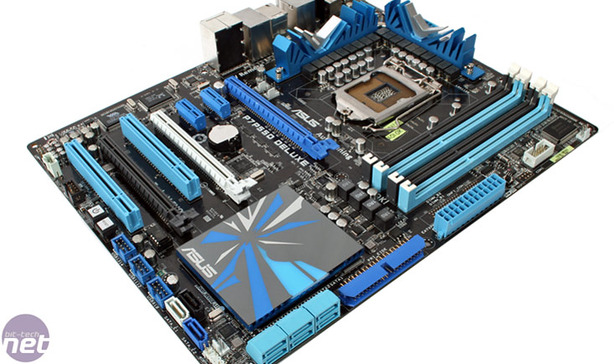Stability
As usual we reset the BIOS to its default values and loaded up both Prime 95 torture test and 3DMark 06 looping to see if the board could withstand the stress to CPU, memory and PCI-Express power draw for 24 hours. Apart from a fan to cool the CPU heatsink, there were no other fans used, meaning the heatsinks and heatpipes have to withstand very little airflow and still keep cool.We found the Asus board was perfectly stable and completely responsive after 24 hours under load, and the heatsinks around the CPU socket did not get notably hot. The P55 heatsink, though, did get hot to touch - a situation not helped by the plastic cap on the top, or if multi-GPU is being used because both prevent airflow. The silicon is rated to withstand ~100ºC though, so it's not really of concern, unless you're heavily overvolting.
Value and Conclusion
At the time of writing we believe the Asus P7P55D Deluxe to retail for around £165. While we appreciate the prices of P55 will be respectively higher than P45 at launch, we feel the Deluxe does not do enough to warrant the cost considering what the competition offers.That's not to say it's bad in any way - in fact, it works excellently: it's stable, and probably the best overclocker we've yet used that provides a consistent and stable 200MHz base-clock. It has tonnes of extras to warrant the Deluxe badge, but it's stuck between the more desirable, yet costly Maximus III Formula (we've used this at a recent event), and budget boards that generally do the same job (we've had a £110 Gigabyte GA-P55M-UD4 at 200MHz base-clock as well).
Asus has innovated all these extra Turbo-this and Hybrid-that, some of which are genuine features we could see ourselves using because they actually do make life easier, yet it can't even get its SATA performance sorted properly. That said, it's stable, the layout is great and the design is very appealing, but for all its merits the £35 cheaper MSI P55 GD65 trades blows in all the tests and keeps up nicely. The MSI may not have hit a 200MHz base clock that will be important for Core i5 750 users limited to a 20x multiplier, but it still keeps up nonetheless.
We really do like the board, it's exceptionally easy to use and has basically everything you'll ever need, but unfortunately that's probably too much for most people in this market. Considering we are only recommending people consider the Core i5 750, and not the i7 LGA1156 CPUs, the P7P55D Deluxe with CPU costs as much as a Core i7 920 and your pick of a dozen X58 motherboards.
While we expect Asus to receive awards elsewhere for its P7P55D Deluxe, we think a British audience who couldn't afford to upgrade to an X58 and LGA1366 board already, will just turn their noses up. Deluxe boards used to be £130 in the mainstream, which was a cusp of affordability for many, so in respect of that the value score is more sensitive and that's only what pulls the board down.
- Features
- x
- x
- x
- x
- x
- x
- x
- x
- x
- -
- 9/10
- Performance
- x
- x
- x
- x
- x
- x
- x
- x
- -
- -
- 8/10
- Value
- x
- x
- x
- x
- -
- -
- -
- -
- -
- -
- 4/10
- Overall
- x
- x
- x
- x
- x
- x
- x
- -
- -
- -
- 7/10

MSI MPG Velox 100R Chassis Review
October 14 2021 | 15:04










Want to comment? Please log in.